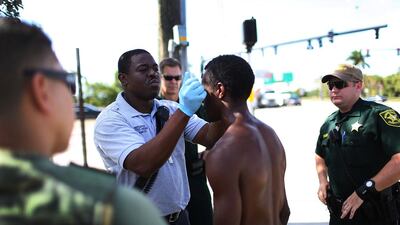Doctors have called for stricter controls of prescription medicines amid concerns over levels of addiction in the Middle East.
Medics told the Hemaya International Forum and Exhibition on Drug Issues of two major worries: the easy availability of medicines like anti-depressants and the mixing of synthetic 'legal highs', some of which can be bought over the internet.
Despite strict controls and tough punishments in the Middle East and elsewhere, dealers often remain ahead of the curve, selling new substances that are yet to be identified and banned.
Dr Tareq Al Ahmedi, Associate Professor of Co-Toxins at King Fahd Security College in Riyadh, singled out 'flakka', which made headlines in the United States last year.
Dubbed the "zombie drug" for sending users into psychotic outbursts, it was linked to 63 deaths in Florida in 16 months and banned in the UAE last year.
On the first day of the Hemaya conference in Dubai, top security officials said that traffickers linked to Hezbollah were arrested trying to bring narcotics into the UAE in an attempt to fund the militant group's activities.
"There is a rise of new synthetic drugs," he said.
"Traffickers are now mixing drugs and legal substances to come up with new forms of addictive drugs, such as flakka."
He made reference to reports of users biting other victims in a violent rage.
Drug dealers are also using websites and social media sites to promote illegal substances.
Eighteen websites have already been shut down since the beginning of 2018 for promoting drugs, Dubai police said on Tuesday.
“Police e-patrols tracked down and closed websites that were found advertising and selling illegal substances,” said Brig Eid Thani Hareb, director of the anti-narcotic department at Dubai Police.
Brig Hareb said these websites belonged to drug traffickers who were not living in the country.
“A total of 60 websites were closed in 2017 for promoting drugs, compared to 40 websites in 2016,” he said.
Brig Hareb said they will continue monitoring the internet and come up with new techniques, such as the use of artificial intelligence, to curb the illegal drug trade.
Dr Al Ahmed also said some people take advantage of mental health medication to get high. Other commonly abused drugs include the strong anti-pain medication tramadol, which cannot be bought over the counter but can be acquired with a special prescription.
“There have been many international conventions to stop the abuse of certain medicines, such as those prescribed for depression,” he said.
“Recent studies show that there will be growing use of industrial drugs in the future.
"I believe some of these industrial drugs have been smuggled into Arab countries."
He referred to a number of cases involving young men who killed their parents when high on drugs, though did not state which Arab state that happened in.
Dr Al Ahmedi also told delegates of the dangers of abusing steroids or performance-enhancement drugs, which as The National has reported, are widely available despite controls.
“Using any type of medication frequently may lead to addiction,” he added.
“There is a need for stricter regulations to control the use of over the counter medicine, especially medicines prescribed for depression,” he said
____________
Read more:
'Zombie drug' flakka is banned by UAE authorities
Traffickers linked to Hezbollah caught trying to sell drugs on streets of UAE
____________
Mona Al Yatamya, a mental health expert in Kuwait, said drugs like flakka will show up in the Gulf states, whatever the controls.
“Flakka is expected to reach the Gulf countries. Consumption or use among people in our countries will result in significant consequences," she said.
She said law enforcement and the authorities cannot take for granted that drugs will not reach the streets of the Gulf.
She said even drug experts "did not expect that crystal meth would be consumed in Gulf countries 17 years ago, yet at the moment, it is widely spread in the market,” she said.
“Although some drug traffickers are behind bars in Kuwait, they manage to find a way to distribute drugs in the country. They have their own ways to distribute drugs in Kuwait. They manage to communicate with others involved in drug trafficking over the phone.”
Dr Hisham Al Araby, from the National Rehabilitation Centre in Abu Dhabi, said in addition to closing loopholes and tackling drug gangs, there must be a focus on rehabilitation.
“Some disorders emerge because of the use of new types of drugs... psychological disorders. Most recovering drug addicts start abusing substances again,” said Dr Al Araby.
Class A-type drugs may be difficult to acquire, but he said many addicts simply mix together a variety of legal or partially controlled substances.
“We have witnessed people struggling with depression who mix tramadol and energy drinks to get high,” he added.

